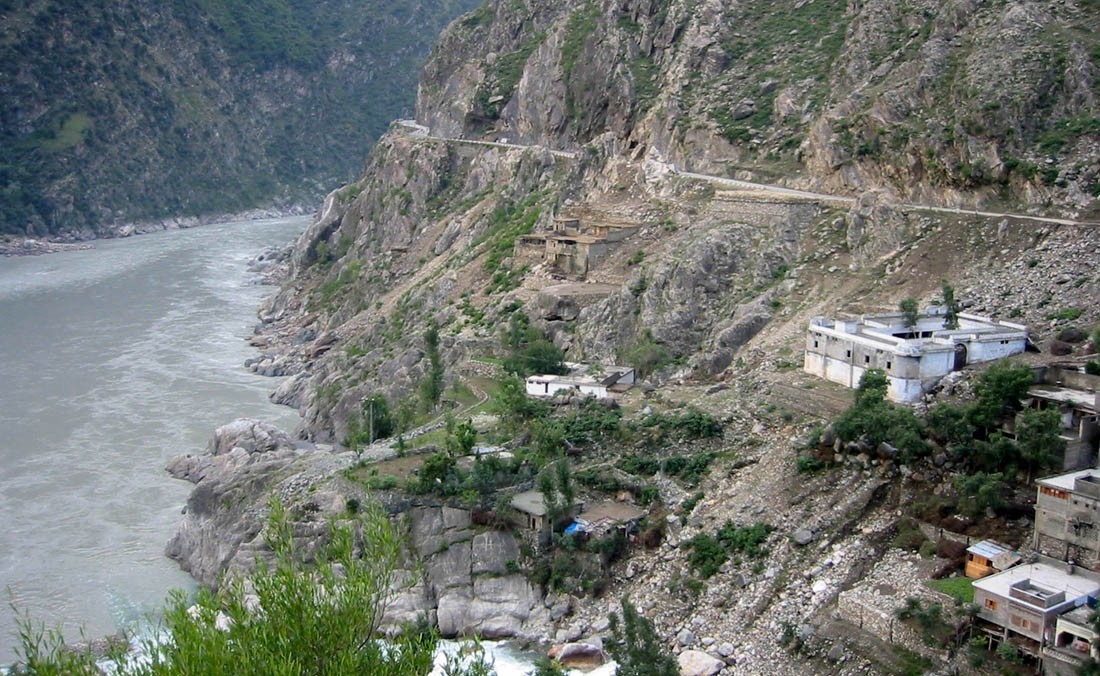
A journey to the village with enough twists and turns, odd signboards and much much more

Searching for roots is a natural impulse that hits many people at some stage in their lives.
I got the urge, not too long ago, to embark on a journey to this remote village with an unpronounceable name, up in the mountains of what is now Khyber-Pakhtunkhwa (KP). This was when Muttahida Majlis-e-Amal (MMA) was running the "vice and virtue" squads in KPK, and "enlightened moderation" was the fashion in the drawing rooms of Islamabad.
I checked with my only cousin who still lives in this remote village. He was delighted to hear that I was planning to come. I asked about the road conditions. He said, no problem, there was a jeepable road from Darband, the nearest town, to the village, and a jeep service ran between Darband and the village. Actually, the town he was talking about is called New Darband, the old Darband having drowned in the Tarbela lake when they built the dam, in the 1960s.
My cousin had one request though. Please don’t come wearing trousers. Come in shalwar kameez.
Not a problem, I said.
Leaving early in the morning, I travelled by car from Mansehra to Oghi and then to Darband. It was a narrow, tarmac road, winding through the pine-forested mountains. Because of the turns and twists in the road, it took us about two hours to cover the 40 miles distance, but it was a picturesque drive, a new scene of mountains and valleys unfolding at every turn.
From Darband onwards, or rather upwards, however, it was a different story. The jeepable road my cousin told me about was only a dirt track, which ran zigzag up a barren mountain. It was originally a foot track that had recently been widened to barely accommodate four tires of a jeep. And the "jeep service" consisted of one jeep plying up and down the track only once every day. It was a 6 miles journey that took 2 hours, we were told.
The ancient jeep we rode was a bare-bone contraption. Other than a steering wheel and the gearstick there were no gadgets or dials on the dashboard. There was a driver’s seat and a passenger seat besides him, which he was kind enough to allot to me. No seats for the passengers at the back, who included four men, two chaddar-clad women and a goat. They stood in the jeep with no rooftop and nothing to hang on to. Of the two women, you could tell from the contours of their chaddars, one was full-figured and other slightly built.
I remember the date, it was June 6, and a very hot and sunny day. It was tough for anyone to stand in the June sun but must have been doubly tough for the women, fully covered in thick chaddars, except for their eyes and a bit of forehead. Poor women!
On one side of the track was the mountain, with scattered mud houses dotting the slope and a few hungry goats grazing at the thorny bushes. On the other side, thousands of feet below, flowed the Indus river. There were sharp turns. It was more like climbing up steep and winding stairs, the vehicle lurching from one step to another. At every turn, the passengers tumbled, and clutched at whatever they could lay their hands on -- mostly each other and the goat. Poor goat!
I could also hear someone recite a prayer at every turn.
At one particularly sharp turn, when the jeep jolted and rocked, one of the two women, the full-figured one, lost her balance and fell forward into the embrace of the man standing opposite, apparently not related to her. She quickly retrieved herself from the embrace, recovered her balance, adjusted her chaddar and stood shakily and invisibly as before. One couldn’t tell how she felt because her face was not visible. But the man looked bewildered and amused.
Everyone else in the jeep kept a straight face, though, as if nothing had happened. Obviously, they were used to the rocky journey.
Half way up the track, I noticed a large signboard ahead. It looked like a well-made traffic sign that you see on highways. From the distance I couldn’t make out what it said, but I guessed it must be a warning of another sharp turn ahead or some safety advice for drivers or passengers. I was amazed at the thoughtfulness of the administration (or whoever had put up the signboard) for taking the pains to put up a traffic sign on such a desolate and inaccessible track with barely any traffic on it.
When we came closer, though, and were able to read the sign, it said, "Yahan gana bajana mana hai -- ba-hukm-e- Assistant Commissioner Oghi" (playing music is prohibited here -- by the orders Assistant Commissioner Oghi)!
And there were two more signs like that on the way up.
My cousin’s advice to come in shalwar kameez made sense now. And I could also understand why my father left this place early in his life.